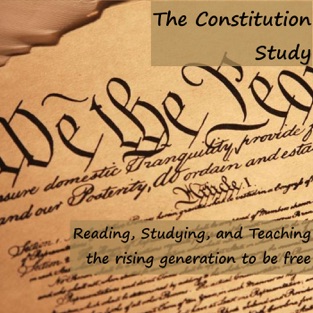
The Constitution Study podcast
Paul Engel: Author, speaker and podcaster
Follow me as I write my book "The Constitution Study". I'll cover interesting facts I discover and answer questions along the way, all with some helpful and humorous analogies.
- 28 minutes 11 seconds502 - Presidential TariffsLove them or hate them, President Trump's tariffs have not only been a talking point, but have had an impact on most Americans. The question before SCOTUS in this case is whether or not the President has the power to create these tariffs in the first place.22 December 2025, 6:00 pm
- 12 minutes 19 seconds501 - Medical freedom or government overreach?
In response to the COVID-19 vaccine mandates, several states passed legislation to put a halt to such practices. For example Idaho recently passed the Medical Freedom Act. The question is, does this legislation protect medical freedom or is it just another example of government overreach.
15 December 2025, 6:00 pm - 12 minutes 48 seconds500 - Free Speech or Free Beer
When I hear people talk about freedom, there seem to be two different general ideas, freedom from something and freedom to do something. It reminds me of my days in Information Technology, when people described "free" open source software as "Free speech, not free beer!" When we talk about freedom today, are we talking about free speech or free beer?
8 December 2025, 6:00 pm - 21 minutes 51 seconds499 - Warrantless Searches1 December 2025, 6:00 pm
- 30 minutes 23 seconds498 - Colorado Conversion Therapy Oral Arguments24 November 2025, 6:00 pm
- 18 minutes 35 seconds497 - Decision on Mexico's Gun Suit
Back in June I wrote about the oral arguments in Mexico's law suit against American gun manufacturers and distributors. While the court overall came to the expected decision, I think it's still worth some time digging into the logic and reasoning of the justices.
17 November 2025, 6:00 pm - 14 minutes 5 seconds496 - Third-Party Laws
Most of us believe that our state legislatures are making our laws. But what if that is only partially true? What if a third-party was making the laws for your state? Would you be OK with that? Would you be concerned to find out that two private entities are making the laws your state uses regarding commerce?
10 November 2025, 6:00 pm - 11 minutes 53 seconds495 - The Unitary Executive
There has been a lot of questions lately about the powers of the President. Can a President fire a member of an independent agency? Does the President have to spend money appropriated by Congress? Is it legal for the President to send the National Guard to our cities. Most of these questions can be answered by understanding a single constitutional point, the unitary executive.
3 November 2025, 5:00 pm - 16 minutes 35 seconds494 - Flag Burning
When it comes to freedom of speech, there are two things that generate a fair amount of controversy. First is yelling "Fire" in a crowded theater and second is burning the United States flag. Recently, Donald Trump issued an Executive Order about flag burning. So let's take a look at the order and some of the history around flag burning.
6 October 2025, 5:00 pm - 19 minutes 11 seconds493 - Police Use of Force
Like any other profession, there are good law enforcement officers, and bad law enforcement officers. While I believe that most LEOs are good men and women, doing a difficult and dangerous job, often with little respect because of the actions of bad LEOs. For years, courts have been protecting these bad officers through their rules and doctrines. A recent Supreme Court case finds that one of those rules violates the Constitution of the United States.
29 September 2025, 5:00 pm - 16 minutes 10 seconds492 - Federal Police Powers
Donald Trump's recent executive order declaring a crime emergency in Washington, D.C. has created quite an uproar, both for and against it. While there have been many claims on both sides, what I haven't seen, except for my radio program, is a real constitutional analysis of his actions. With his recent announcement post about sending National Guard troops to Chicago, I think it's time we do that type of analysis.
22 September 2025, 5:00 pm - More Episodes? Get the App